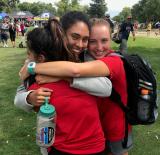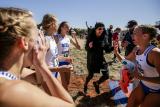Folders |
Running Issues: Eating Disorder MythsPublished by
Bust Six Misconceptions About Food And Body Issues In Athletics By Elizabeth Carey of DyeStat Myths about eating disorders abound in sport and culture at large. “There are so many misconceptions in track with food and body,” says Riah Bentley, therapist at Opal Food and Body Wisdom eating disorder treatment center and also a high school coach in Seattle. “It doesn’t just stop at an event. This conversation is for everybody.” What if we, as a sport, approached this with non-judgmental understanding? That’s how Bentley believes we could make a lot of change. “If we can create space we can handle these issues at the outset,” she says. “There needs to be a lot more talk, a lot more communication around the things that happen in sport. We have to be more proactive in creating a space so athletes know they can talk.” In researching Girls Running, I spoke with experts who echoed this sentiment. They also helped uncover important, evidence-based truths. On the heels of National Eating Disorder Awareness Week, let’s take a closer look at a handful of harmful fictions about food and body issues and how to debunk them. Myth: Anorexia and bulimia are the only serious food and body issues. Eating disorders one of the deadliest mental health illnesses. Food and body issues exist on a spectrum from disordered behaviors to medically-coded diagnoses. Symptoms often overlap. They may be related to body image, compulsive exercise, or an underlying mental health condition. But anyone who is struggling deserves treatment and care. More recently recognized disorders include binge eating disorder and orthorexia (an unhealthy obsession with healthy food). Myth: You can tell whether someone has an eating disorder by looking at them. Nope, you cannot diagnose an eating disorder by appearance. “Eating disorders can happen to any athlete, any gender and in any sport, with any body shape, size, weight, and do not ‘just’ occur in programs where coaches may weigh athletes or encourage them to drop weight, although this increases the risk of eating disorders and should not be happening,” says Rachael Steil, founder of Running In Silence, high school cross country and track coach and author of Running In Silence. Myth: Lighter is faster. This deep-seated myth about running confuses physics and metabolism, as registered dietitian Megan Medrano, of Run Whole Nutrition, has pointed out. If or when restriction or losing weight seems initially to be a short-cut to performance gains, that does not last and invites a host of health and performance consequences, including the symptoms of Relative Energy Deficiency in Sport (RED-S). This belief, alongside others about what bodies are best for a specific event, perpetrates a narrow view of who can, may, or will be successful. “There’s so much pressure on athletes. Because of the size of my body the coaches told me what I was doing,” says Bentley, who would have rather been jumping than sprinting as a high school freshman and sophomore and who went on to jump in college. There’s a “lack of autonomy where we start to judge where athletes should be because of their body.” Myth: As a coach, it’s OK for me to weigh athletes, tell them to lose weight or go on a diet, and/or shame and mock their appearance. No. Just stop. Please. Educate yourself about the harmful effects of this tactic and use a more productive approach. “Recognize your power by explicitly setting the team culture around food and body relationships,” as Kara Bazzi, clinical director and co-founder of Opal Food and Body Wisdom, says. Subscribe to Opal’s podcast, The Appetite, and actually listen. Resources abound, but coaches must seek them out, and examine our own body relationships. “How we value and honor our own bodies impacts how we value and honor the bodies of others,” writes Sonya Renee Taylor in her book The Body Is Not An Apology. Myth: If I talk about eating disorders, someone will get ideas or I’ll say something wrong or they’ll just deny it. Silence and stigma breed shame and allow eating disorders and other mental health issues to fester. While some athletes may be at higher risk than others, prevention and education are closely linked. The sooner an intervention, the better the prognosis. So, let’s talk about it! Express concern. Provide support. Refer athletes to specialists. Myth: Your body should be and stay a certain way From the moment you’re born til the second you die, your body is changing. During some phases of life — for example, puberty — this fact is more obvious. A multitude of confounding factors influence the shape your body takes, including age, genetics, illness, and training, throughout the life cycle. We are not static, nor does that sound like any fun. The National Eating Disorders Association Toll-free, confidential helpline: 1-800-931-2237 myneda.org/helpline-chat Text NEDA to 741-741 Other resources include Project Heal (https://www.theprojectheal.org/treatment-access), Beat EDs (https://www.beateatingdisorders.org.uk/), Alliance for Eating Disorders (https://www.allianceforeatingdisorders.com/), and MEDA (https://www.medainc.org/). ### Elizabeth Carey (https://elizabethwcarey.com/) is a writer and running coach based in Seattle, Washington. Her first book, GIRLS RUNNING, co-authored with Melody Fairchild, is available at your local book store and here: https://shop.aer.io/GirlsRunning/p/Girls_Running_All_You_Need_to_Strive_Thrive_and_Run_Your_Best/9781948007184-9934. |







